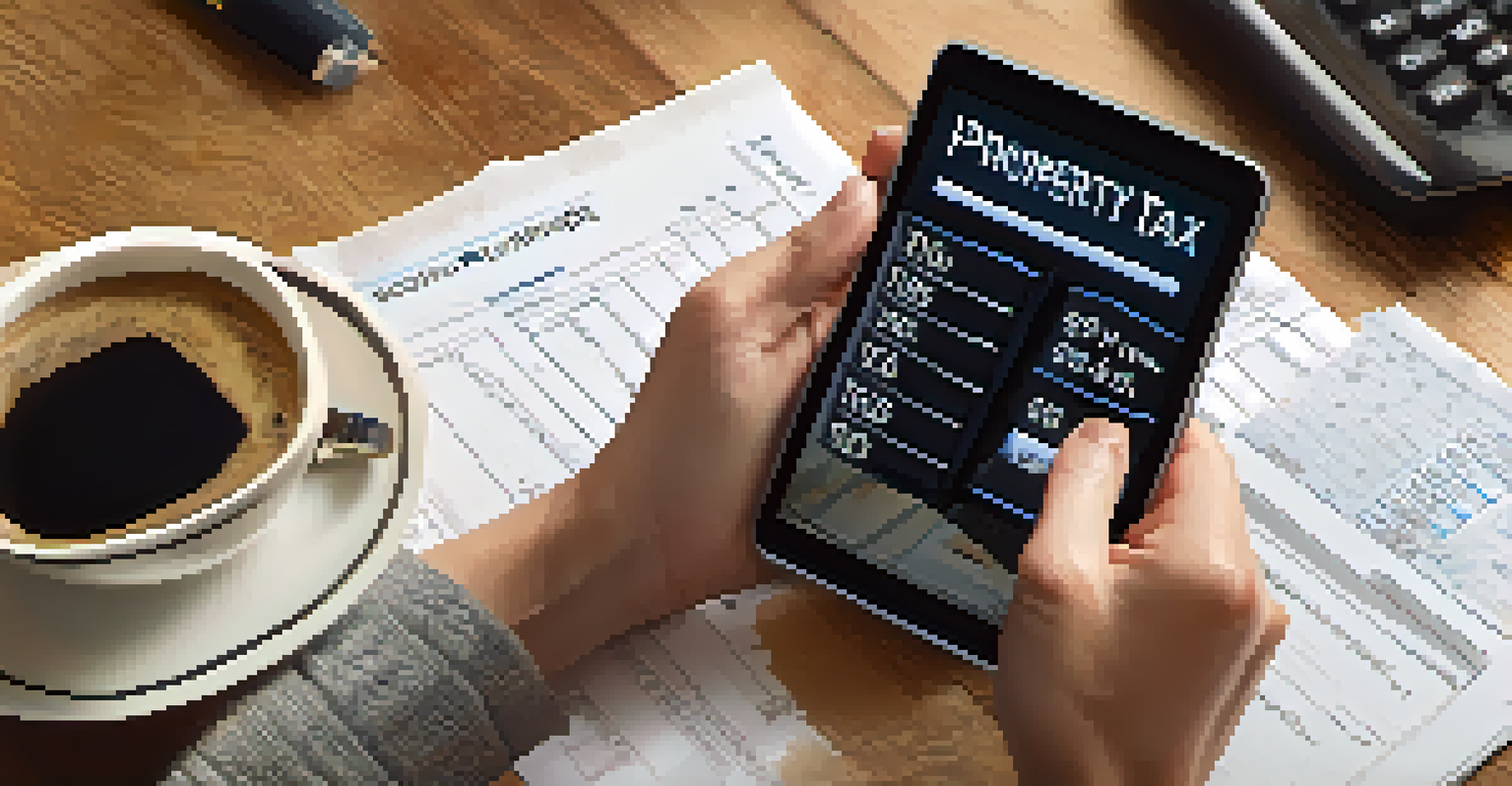The Impact of Property Tax Assessments on First-Time Buyers

What Are Property Tax Assessments and Why They Matter?
Property tax assessments are evaluations conducted by local governments to determine the value of a property for taxation purposes. This value directly influences the amount of taxes homeowners must pay each year. For first-time buyers, understanding this concept is crucial, as it can significantly impact their overall budget and financial planning.
The best way to predict the future is to create it.
When you purchase a home, the assessed value usually reflects the market value, but not always. If a home is assessed higher than its market value, it could lead to unexpected tax bills that stretch a new homeowner's finances. Thus, being aware of how properties are assessed can help first-time buyers make more informed decisions.
Moreover, local tax rates can vary widely, adding another layer of complexity. A home in a neighborhood with high tax rates can quickly become unaffordable, even if the purchase price seems reasonable. That's why first-time buyers should factor in these assessments when calculating their long-term financial commitments.
How Assessments Impact Monthly Mortgage Payments
One of the most immediate effects of property tax assessments is their impact on monthly mortgage payments. Lenders often include estimated property taxes in the monthly payment calculations, impacting affordability. For first-time buyers, this means that a higher assessment can lead to higher monthly costs, which may strain their budgets.

Additionally, if the assessed value of a home increases after purchase, it can lead to a spike in property taxes over time. This is something to keep in mind; if the buyer initially feels comfortable with their payments, future increases could become a financial burden. Thus, understanding assessment trends can help buyers prepare for the long haul.
Understanding Property Tax Assessments
Property tax assessments determine a home's value for taxation, impacting financial planning for first-time buyers.
In essence, first-time buyers should not only focus on the purchase price but also how property tax assessments will affect their overall cost of home ownership. Taking these factors into account can lead to more sustainable financial health in the long run.
The Role of Local Government in Assessments
Local governments play a key role in property tax assessments as they determine the methods and frequency of property evaluations. Different regions have varying approaches, which can affect how first-time buyers navigate the housing market. Knowing how your local government assesses properties can provide valuable insights into potential tax obligations.
An investment in knowledge always pays the best interest.
In some areas, assessments are conducted annually, while in others, they may occur every few years. This inconsistency can lead to surprises for new homeowners, especially if they aren't prepared for a reassessment. For first-time buyers, understanding this timeline can help avoid unpleasant financial surprises.
Engaging with local officials or researching community resources can be beneficial. By being proactive, first-time buyers can gain clarity on what to expect and how to budget accordingly, ensuring they are not caught off guard by sudden tax hikes.
Ways to Challenge Property Tax Assessments
If a first-time buyer believes their property has been overvalued, they have the option to challenge the assessment. This process usually involves gathering evidence, such as recent comparable sales, and presenting it to the local tax authority. It's a crucial step for homeowners who feel their tax burden is unfairly high.
Challenging an assessment can be a daunting task, but it can lead to significant savings. Many first-time buyers may not be aware that they have this right, which can lead to unnecessary financial strain. By understanding this process, they can take control of their financial situation and potentially reduce their tax bills.
Assessments Affect Monthly Costs
Higher property tax assessments can lead to increased monthly mortgage payments, straining budgets for new homeowners.
Additionally, many local governments offer resources and assistance for those looking to contest their assessments. First-time buyers should take advantage of these resources to ensure they are not overpaying and to foster a more sustainable financial future.
The Impact of Property Taxes on Home Affordability
Property taxes can significantly influence home affordability for first-time buyers. A higher property tax rate can take a sizable chunk out of a buyer's budget, making certain neighborhoods less accessible. This can lead to a frustrating search for homes that fit within their financial constraints.
Moreover, these taxes are often a recurring expense that buyers must account for throughout homeownership. If a buyer stretches their budget to purchase a home in a desirable location, they might find themselves struggling to cover the property taxes that come with it. Awareness of these costs from the beginning can help in making more financially sound decisions.
Ultimately, first-time buyers should evaluate how property taxes fit into their overall housing budget. This includes not only the mortgage payment but also property taxes, insurance, and maintenance costs. By doing so, they can find a home that meets their needs without compromising their financial stability.
Long-Term Financial Planning and Property Taxes
Proper long-term financial planning is essential for first-time homebuyers, especially when it comes to property taxes. Municipalities often change tax rates based on budgetary needs, which can lead to fluctuating expenses. Buyers should anticipate these changes and budget accordingly to avoid financial strain.
Creating a comprehensive budget that includes potential increases in property taxes is vital. This can involve setting aside funds for unexpected tax hikes or for renovations that may lead to reassessments. By planning for the long term, first-time buyers can safeguard their investment and maintain financial health.
Resources for Tax Challenges
First-time buyers can challenge overvalued assessments and should utilize local resources to avoid unnecessary tax burdens.
It's also wise to regularly review and adjust financial plans as circumstances change. This can involve revisiting property tax assessments and overall housing costs annually. Such diligence can help buyers stay ahead of potential financial pitfalls.
Resources for First-Time Buyers on Property Taxes
Navigating property taxes can be overwhelming for first-time buyers, but numerous resources can help simplify the process. Local government websites often provide valuable information on tax rates, assessment processes, and ways to appeal assessments. Familiarizing oneself with these resources can empower buyers to make informed decisions.
In addition to government resources, various online platforms offer guides and tools for understanding property taxes. Websites dedicated to real estate often include calculators that can estimate property taxes based on assessed value, giving buyers a clearer picture of their potential expenses. This proactive approach can lead to better financial planning.

Moreover, consulting with real estate agents or financial advisors can provide personalized insight. These professionals can help first-time buyers navigate the complex landscape of property taxes, ensuring they have the knowledge needed to make sound decisions in their home-buying journey.